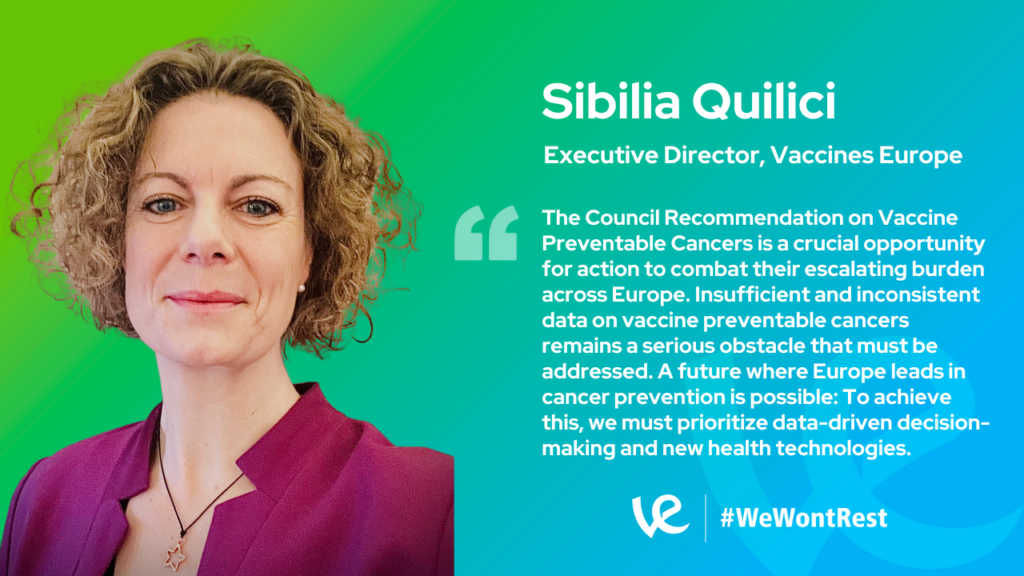Vaccines Europe - 31 Jan 2024
Vaccines Europe and EFPIA, representing the pharmaceutical industry and vaccine manufacturers across Europe, support the Council Recommendation on Vaccine Preventable Cancers. While a European Immunisation Strategy is required to build more resilient and sustainable health systems, the Council Recommendation is a very important first step in this direction.
40% of all cancers are preventable and vaccination is a proven preventive measure for both HPV, which can lead to cervical cancer and other HPV related cancers affecting all genders, and HBV, which can lead to liver cancer. We are encouraged by the acknowledgement of the need to strengthen the role of the European Centre for Disease Control (ECDC) in quality and timely data collection for HBV and HPV vaccination, learning from the COVID-19 vaccine tracker. To enable this, Member States must improve data collection practices, which vary considerably across Europe.
We further welcome the Commission’s intention to promote R&D and innovation for HBV and HPV vaccines, noting the importance of extending this support to innovations in early detection, diagnosis, and treatment. The recommendation for Member States to provide vaccination free of charge or fully reimbursed coupled with a continued investment in prevention will enable the broadest possible access to these vaccines.
With strong immunisation policies and programmes that are effectively implemented, we have a unique possibility to eliminate disease and infection-associated cancers by:
- Helping to enable Europe’s Beating Cancer Plan to achieve its objectives, tracking progress with defined KPIs and supporting accountability in its holistic and timely implementation by all stakeholders, in particular Member States.
- Ensuring high-quality data is translated into policy recommendations.
- Establishing forums at the EU level involving all relevant national stakeholders for sharing best practices.
- Ensuring sufficient and sustained resource allocation for building and maintaining national level data, disease, and cancer surveillance systems, with adequate levels of transparency and regular and timely publication of those data to stakeholders.
- Supporting Member States in identifying the appropriate channels to reach populations at large toward participation in screening and vaccination campaigns and ensuring sufficient communication.
- Increasing accessibility to vaccination through innovative delivery systems and optimization of existing pathways by removing physical and bureaucratic barriers.
The escalating burden of cancer is evident, with forecasts indicating a 24% increase in cases by 2035, positioning it as the leading cause of death in the EU and Europe is falling behind in addressing this.
Widespread inconsistencies in data reporting and uptake of vaccines across Europe
Cervical cancer is the second most common cancer in women aged 15-44 in the EU, with 58,169 new cases annually and 14,700 annual anogenital cancers can be attributed to HPV, with 5,400 occurring in men. Further, HBV results in 60,000 deaths annually and in Germany, 93% of HBV cases occurred in unvaccinated individuals.
Significant disparities exist in HPV vaccination coverage rates (VCR) across European countries. Portugal is the only country meeting the EBCP target of a 90% VCR for girls while five countries have VCRs below 50%, with Bulgaria maintaining a VCR below 10% for the past decade. Even when data is collected, translation into actions and recommendations is often inconsistent. For instance, although countries like Germany collect comprehensive data on HBV, vaccine recommendations vary widely with some countries not vaccinating children, while for adults, recommendations remain risk-based and inconsistent across Member States.
The Council Recommendation provides a pivotal opportunity for Europe to strengthen efforts to address vaccine preventable cancers through enhanced vaccination uptake, timely monitoring of vaccine programmes and access to data.
Case study
The success of Denmark in using digital tools, such as the Immunisation Implementation System (IIS), highlights the potential for comprehensive data systems to improve vaccination rates. All vaccines administered in Denmark, whether in a public or private setting, are registered. The Danish IIS features a reminder and recall system, an Electronic Vaccination Registry providing a breakdown of vaccination coverage rates by region and across targeted groups, and gathers data on participation in screening programmes.


 Members area
Members area

